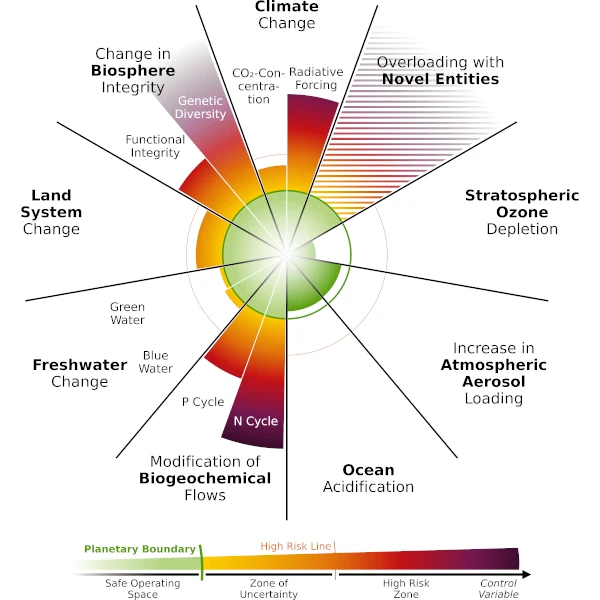
The Earth system is a complex system due to its multiple interconnected components, its non-linear feedbacks, and its emergent behavior, which is difficult to predict from the properties of its individual elements alone.
The major interacting subsystems—climate, oceans, freshwater, biosphere, human activities—do not follow a simple cause-and-effect relationship but can amplify unpredictably. It is enough for a single threshold to be reached for the system to tip and generate cascading disruptions. These irreversible thresholds are "points of no return" and not "passage points" in gradual changes.
In physics and mathematics, a bifurcation refers to a qualitative change in the behavior of a dynamic system when one of its parameters exceeds a critical value. This concept, central to the theory of complex systems, explains how small modifications can cause abrupt and radical transformations.
During a bifurcation (pitchfork bifurcation), a stable equilibrium point divides into two new stable solutions while itself becoming unstable; the transition is irreversible beyond the threshold. For example:
During a bifurcation (saddle-node or fold bifurcation), two fixed points, one stable and one unstable, meet and disappear in a structural collapse. For example:
During a bifurcation (Hopf bifurcation), a stable fixed point becomes unstable as the system's parameters evolve (slowly or by threshold), while giving rise to a stable limit cycle. For example:
Our world interacts with multiple systems—climatic (clouds and cloud cover, etc.), ecological (agricultural crisis and declining yields, etc.), social and political (democratic regimes, etc.), economic and technological (financial markets, etc.), cultural and cognitive (collapse of common narratives, etc.).
These equilibria seem durable but are actually maintained in dynamic regimes sensitive to critical parameters. When a parameter crosses a threshold, the system can undergo a bifurcation, i.e., suddenly lose its initial stability to evolve into a completely unpredictable state. Depending on the nature of the bifurcation, transitions can be more or less abrupt.
This phenomenon, well-known in physics, mathematics, and biology, also applies to our societies. Weak signals accumulate in the system (geopolitical tensions, global warming, biodiversity loss, technological interdependence, rising global debt, capital concentration, growth of populist movements, widespread distrust of science, increasing tensions over drinking water, accelerated aging of populations, rapid urbanization, explosion of misinformation, modification of shared reality, growth of uncontrollable AI, societies' capacity for adaptation, etc.)
If the "World System" approaches any critical point, bifurcation is imminent, and the system is close to a radical shift. We all feel that our planet is approaching one or more critical thresholds where major bifurcations could occur, with irreversible consequences for human societies. Faced with these multiple potential tipping points, humanity is confronted with an unprecedented challenge: understanding these critical thresholds allows us to prepare for inevitable transformations.
Paradoxically, the stable state that our society is about to lose could well be the Stability of Global Predictability, i.e., the ability to project the future in the medium term. This could trigger a set of cascading consequences linked to coupled instabilities (ecological, energy, social, technological, etc.).